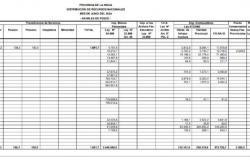The Undersecretary of Foreign Affairs, Gloria de la Fuente, indicated that “all international legal cooperation mechanisms are activated, what is basically missing is the cooperation” of the Maduro regime in the case of former military man Ojeda.
Thursday June 6, 2024 7:39 p.m.
Photo: Aton.
This afternoon the Chilean Foreign Ministry delivered a protest note to Venezuela by the statements of the attorney general of that country, Tarek William Saab, regarding the crime of former lieutenant Ronald Ojeda, kidnapped and murdered in national territory and among whose perpetrators, according to the Venezuelan persecutor, there would be Chilean security agents.
The delivery of the diplomatic complaint was confirmed by the Undersecretary of Foreign Affairs, Glory of the Fountainwho received the Venezuelan ambassador in Chile, Arevalo Mendez Romero as acting chancellor to express the annoyance of President Boric’s Government.
De la Fuente stated that “Chile will continue to insist on the Venezuelan authorities to hand over all the information they have regarding the international arrest warrant and thus be able to move forward with the investigation being carried out,” he said.
The authority also indicated that “All international legal cooperation mechanisms are activated, what is basically missing is cooperation on the part of Venezuela“.
“All the mechanisms that we have at our disposal are being evaluated, including the possibility of calling our ambassador in Venezuela for consultation, but for now we are waiting for a response regarding the situation and the particular note of protest that we have raised,” He held authority.
“AND regarding breaking relationshipswhich is something that has been in the discussion that some parliamentarians have raised, I believe that yesterday our chancellor was clear and categorical. We are interested in advancing research“We are interested in the Public Prosecutor’s Office being able to do its job and for that we need cooperation, and, therefore, it is not under discussion, because we believe that if we break relations it obviously makes the situation difficult regarding the development of the investigation,” he added.
Regarding the possibility of resorting to international organizations, as Minister Carolina Tohá mentioned earlier, De la Fuente commented that “we are without a doubt evaluating any international mechanism(…) therefore, it will call upon those elements that are typical of the bilateral relationship, such as, for example, citing the Palermo agreement eventually if the people are captured.”
“The first thing is that people are arrested, once arrested, effectively The Venezuelan constitution does not consider extradition as a mechanismbut there is an agreement that both our country and Venezuela have signed, which is the Palermo agreement, which means that once people are arrested, Chile makes a request for those people to make themselves available to the competent authorities that “These people must be tried in national territory,” he said.
This afternoon the Chilean Foreign Ministry delivered a protest note to Venezuela by the statements of the attorney general of that country, Tarek William Saab, regarding the crime of former lieutenant Ronald Ojeda, kidnapped and murdered in national territory and among whose perpetrators, according to the Venezuelan persecutor, there would be Chilean security agents.
The delivery of the diplomatic complaint was confirmed by the Undersecretary of Foreign Affairs, Glory of the Fountainwho received the Venezuelan ambassador in Chile, Arevalo Mendez Romero as acting chancellor to express the annoyance of President Boric’s Government.
De la Fuente stated that “Chile will continue to insist on the Venezuelan authorities to hand over all the information they have regarding the international arrest warrant and thus be able to move forward with the investigation being carried out,” he said.
The authority also indicated that “All international legal cooperation mechanisms are activated, what is basically missing is cooperation on the part of Venezuela“.
“All the mechanisms that we have at our disposal are being evaluated, including the possibility of calling our ambassador in Venezuela for consultation, but for now we are waiting for a response regarding the situation and the particular note of protest that we have raised,” He held authority.
“AND regarding breaking relationshipswhich is something that has been in the discussion that some parliamentarians have raised, I believe that yesterday our chancellor was clear and categorical. We are interested in advancing research“We are interested in the Public Prosecutor’s Office being able to do its job and for that we need cooperation, and, therefore, it is not under discussion, because we believe that if we break relations it obviously makes the situation difficult regarding the development of the investigation,” he added.
Regarding the possibility of resorting to international organizations, as Minister Carolina Tohá mentioned earlier, De la Fuente commented that “we are without a doubt evaluating any international mechanism(…) therefore, it will call upon those elements that are typical of the bilateral relationship, such as, for example, citing the Palermo agreement eventually if the people are captured.”
“The first thing is that people are arrested, once arrested, effectively The Venezuelan constitution does not consider extradition as a mechanismbut there is an agreement that both our country and Venezuela have signed, which is the Palermo agreement, which means that once people are arrested, Chile makes a request for those people to make themselves available to the competent authorities that “These people must be tried in national territory,” he said.
This afternoon the Chilean Foreign Ministry delivered a protest note to Venezuela by the statements of the attorney general of that country, Tarek William Saab, regarding the crime of former lieutenant Ronald Ojeda, kidnapped and murdered in national territory and among whose perpetrators, according to the Venezuelan persecutor, there would be Chilean security agents.
The delivery of the diplomatic complaint was confirmed by the Undersecretary of Foreign Affairs, Glory of the Fountainwho received the Venezuelan ambassador in Chile, Arevalo Mendez Romero as acting chancellor to express the annoyance of President Boric’s Government.
De la Fuente stated that “Chile will continue to insist on the Venezuelan authorities to hand over all the information they have regarding the international arrest warrant and thus be able to move forward with the investigation being carried out,” he said.
The authority also indicated that “All international legal cooperation mechanisms are activated, what is basically missing is cooperation on the part of Venezuela“.
“All the mechanisms that we have at our disposal are being evaluated, including the possibility of calling our ambassador in Venezuela for consultation, but for now we are waiting for a response regarding the situation and the particular note of protest that we have raised,” He held authority.
“AND regarding breaking relationshipswhich is something that has been in the discussion that some parliamentarians have raised, I believe that yesterday our chancellor was clear and categorical. We are interested in advancing research“We are interested in the Public Prosecutor’s Office being able to do its job and for that we need cooperation, and, therefore, it is not under discussion, because we believe that if we break relations it obviously makes the situation difficult regarding the development of the investigation,” he added.
Regarding the possibility of resorting to international organizations, as Minister Carolina Tohá mentioned earlier, De la Fuente commented that “we are without a doubt evaluating any international mechanism(…) therefore, it will call upon those elements that are typical of the bilateral relationship, such as, for example, citing the Palermo agreement eventually if the people are captured.”
“The first thing is that people are arrested, once arrested, effectively The Venezuelan constitution does not consider extradition as a mechanismbut there is an agreement that both our country and Venezuela have signed, which is the Palermo agreement, which means that once people are arrested, Chile makes a request for those people to make themselves available to the competent authorities that “These people must be tried in national territory,” he said.







